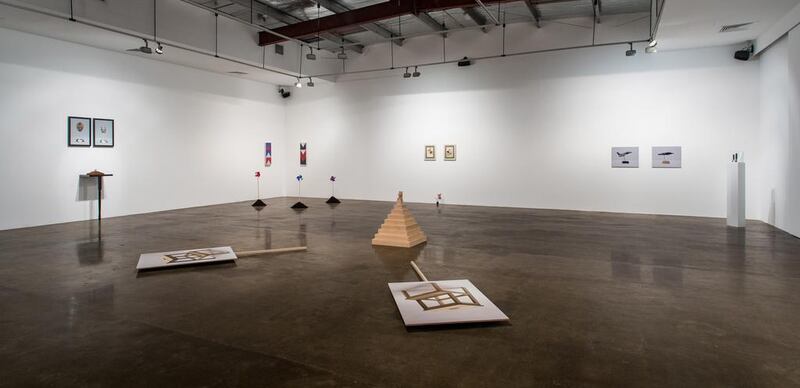More than 10 years ago, Babak Golkar, an Iranian-Canadian ceramic artist, bought a cheap vase from Ikea and took it home. He cast a mould from it, which included the embossed Ikea stamp on the base, and he made a replica of the vase from very fine, slightly pink-tinted porcelain.
Then, he returned it to the store where they immediately accepted the item as their own product thanks to the stamp. Without documentation of the act, the artist was left with only the original poor-quality vase and, dissatisfied, he put the idea aside to pursue others.
Golkar eventually returned to the project and the final result is now on show in The Third Line gallery in Dubai.
The Return Project is the documentation of the same process that Golkar began with that Ikea vase. It presents before-and-after photographs of a selection of domestic objects that Golkar has dissected and deconstructed, in some cases beyond recognition, and then repackaged and returned to the stores. He has displayed the photographs alongside physical objects made from the "surplus", or the part of the original that he removed.
For example, a strawberry-scented candle is presented in two photos, one noticeably shorter than the other. In front of these images is the wax that was removed, which has been melted down and cast in the shape of the artist's fist making a thumbs-up sign. The piece is sarcastically called Mission Accomplished.
The items, which Golkar calls "orphaned souvenirs of a performative act" are not only surplus materials, they have, in fact, created "surplus value both culturally and monetarily" and are key parts of the exhibition.
Collectively, the items are a searing commentary on the structure of contemporary art practices and the commercialisation of art. By operating within the commercial market, Golkar has managed to disrupt the limits of the system, which exists to offer us goods in a competitive market.
"I like the idea of performing systems because it proposes the idea that to legitimately criticise something you have to be part of it," he explains. "I find that extremely interesting."
The physical results of Golkar's project have almost become by-products and are circulating in a rogue-like fashion in the marketplaces they originally came from, without consumers' knowledge.
In But a Storm Is Blowing, a garden cherub from Walmart was cleverly altered so that its eyes, which were closed, were opened and its wings were cut off. The new-look cherub was returned to the store and will have been sold to someone else who is probably completely unaware of what they now possess.
"Each piece is authenticated as a unique piece of art," says Golkar, explaining that this is an important aspect of the project. He has marked each item with a signature or a small note for the new owner but other than that, he has little concern about what happens to the works. "I'm just happy that someone can have it," he says.
Several of the items in the show are framed prints of items that Golkar has altered by painting unique pieces that are of significantly higher quality than the originals and are, in fact, collectable items.
This is clearest in Fair Trade - a print that was "pretending to be a watercolour of a peony" that Golkar replaced with a watercolour of a poppy. Golkar cut out the peony flower from the original and placed it in a makeshift version of an opium pipe. The pipe was made from half a plastic water bottle, a straw and some dirty water.
The piece reveals the multiple strata of this exhibition, in that individually each artwork tells a separate story about topical issues that bother Golkar, but over which he has no control.
"I had to develop a specific artistic language and go through certain steps to allow me to tackle subjects I had always wanted to tackle," he says. "The work comes towards a space of anxiety about these conditions that I am powerless about as an individual.
"I can't change the opium trade or the fashion industry. I can't change war, modernity, history or morality. This art is as far as I can interject."
. The Return Project runs until November 8 at The Third Line, Dubai. Visit www.thethirdline.com
aseaman@thenational.ae
Babak Golkar is back at The Third Line with The Return Project
The exhibition presents before-and-after photographs of a selection of domestic objects that Golkar has dissected and deconstructed, and then repackaged and returned to the stores.

Editor's picks
More from The National




